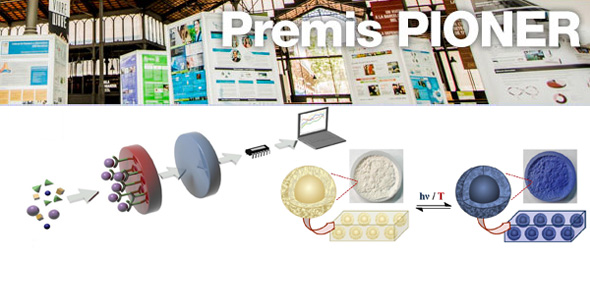Thursday, 17 December 2015
Nanobiosensors and photofunctional materials designed at ICN2 recognized by the PIONER Awards
The ceremony of the second edition of the PIONER Awards has been held today at the headquarters of the CERCA Institution in Barcelona.

Developing a doctoral thesis is one of the first major challenges of the research career. In these early stages it is very important that researchers are aware that their results may have not only a great scientific value, but also commercial and industrial implications. For this reason, promoted by the Research Centers of Catalonia (CERCA), the CERCA Institution promotes the PIONER Awards in order to distinguish those researchers who have developed a doctoral thesis with a clear commercial potential.
The ceremony of the second edition of the PIONER Awards was held today at the headquarters of the CERCA Institution (Via Laietana, 2; Barcelona). Five young people who have developed their doctoral thesis within a CERCA center received the award for having initiated or strengthened a technology or product with industrial interest. Two of these awards have recognized the work of doctors who developed their doctoral thesis in the Catalan Institute of Nanoscience and Nanotechnology (ICN2).
The first awarded ICN2 doctoral thesis focuses on the development of optical biosensors for diagnosis and therapeutic monitoring of various diseases, such as allergy, celiac disease or cancer. The author of the thesis, entitled "Nanoplasmonic Biosensors for Clinical Diagnosis at the Point of Care" is Dr Maria Aznar Soler, who worked under the direction of Dr M. Carmen Estevez and CSIC Research Prof Laura M . Lechuga, Group Leader of the ICN2 NanoBioSensors and Bioanalytical Applications (NanoB2A) Group.
The second ICN2 thesis applies encapsulation technologies to design intelligent materials with photochromic and thermochromic properties. It is entitled "Encapsulation of stimuli-responsive molecules for the preparation of photofunctional materials" and has been written by Dr. Nuria Vazquez, under the direction of CSIC Research Prof Daniel Ruiz, Group Leader of the ICN2 Nanostructured Functional Materials (NanosFun), and Prof. Jordi Hernando, from the Chemistry Department at the Autonomous University of Barcelona (UAB).
The rest of the winners are Dr Michal Drozdzal, from the Computer Vision Centre (CVC); Dr Alessandro Franci, from the International Center for Numerical Methods in Engineering (CIMNE); and Dr Benjami Oller Salvia, from the Institute for Research in Biomedicine (IRB Barcelona). The fact that two of five awards have been awarded to researches developed at ICN2 evidences the commercial potential of the work developed at this center.

